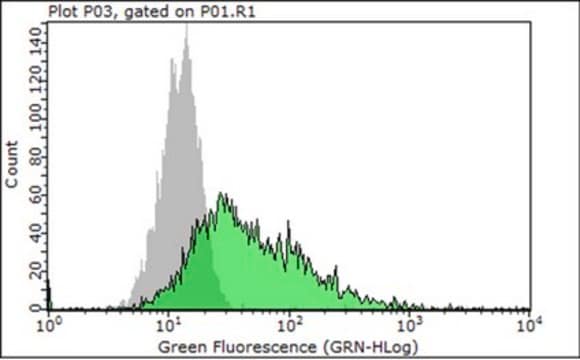MAB1998
Anti-Integrin α2β1 Antibody, clone BHA2.1
clone BHA2.1, Chemicon®, from mouse
Sinónimos:
VLA-2
About This Item
Productos recomendados
biological source
mouse
Quality Level
antibody form
purified immunoglobulin
antibody product type
primary antibodies
clone
BHA2.1, monoclonal
species reactivity
human, canine, pig
manufacturer/tradename
Chemicon®
technique(s)
flow cytometry: suitable
immunohistochemistry (formalin-fixed, paraffin-embedded sections): suitable
immunoprecipitation (IP): suitable
isotype
IgG1κ
NCBI accession no.
UniProt accession no.
shipped in
wet ice
target post-translational modification
unmodified
Gene Information
human ... ITGA2(3673)
Specificity
Application
Cell Structure
Integrins
Immunoprecipitation: Immunoprecipitation of VLA-2 integrins from lysate of 10E6 cell equivalent requires 2-5 μg of BHA2.1
immunohistochemistry in frozen tissue sections: 5 μg/mL
Immunohistochemistry in paraffin sections: 1:50. Block endogenous peroxidase using 0.5% H202 in 80% ethanol, 30 min and unspecific reactions using NGS 1:5 in PBS, 20min RT. Bouin′s fixative solution has been used successfully. Incubation time, conditions: 24 h; 4°C; pretreatment: 0.1% trypsin, 30 min, 37°C. Intracytoplasmic staining near cell membranes.
Does not detect alpha2 integrin subunit by Western blot presumably due to conformational properties of the epitope involved. The epitope for BHA2.1 is dependent on the presence of the (I) domain of alpha2 integrin subunit and does not bind VLA-2 variant which lacks the I-domain.
Function Blocking: BHA2.1 inhibits VLA-2 mediated cell adhesion to collagen and laminin; complete inhibition can generally be achieved at a final concentration of 10 μg/mL.
Final working dilutions must be determined by end user.
Physical form
Storage and Stability
Analysis Note
Skin, CD4 & CD8 positive T cells
Other Notes
Legal Information
Disclaimer
¿No encuentra el producto adecuado?
Pruebe nuestro Herramienta de selección de productos.
Storage Class
10 - Combustible liquids
wgk_germany
WGK 2
flash_point_f
Not applicable
flash_point_c
Not applicable
Certificados de análisis (COA)
Busque Certificados de análisis (COA) introduciendo el número de lote del producto. Los números de lote se encuentran en la etiqueta del producto después de las palabras «Lot» o «Batch»
¿Ya tiene este producto?
Encuentre la documentación para los productos que ha comprado recientemente en la Biblioteca de documentos.
Nuestro equipo de científicos tiene experiencia en todas las áreas de investigación: Ciencias de la vida, Ciencia de los materiales, Síntesis química, Cromatografía, Analítica y muchas otras.
Póngase en contacto con el Servicio técnico






